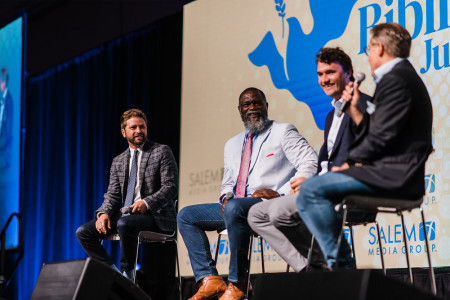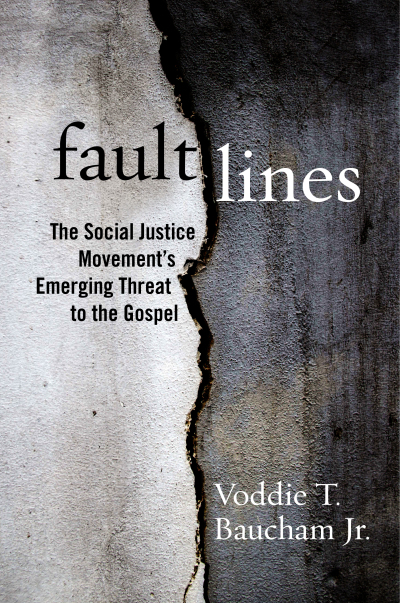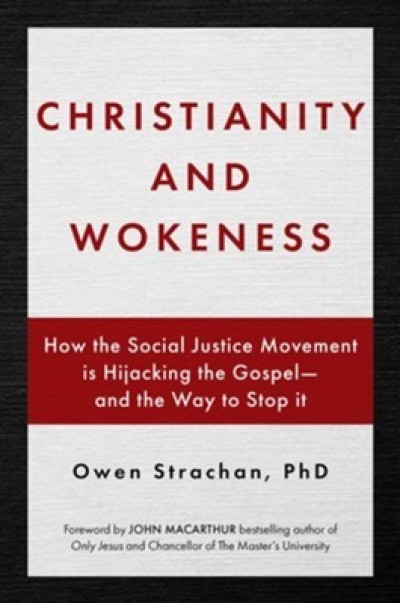Voddie Baucham, Owen Strachan urge Church to combat 'morally bankrupt,' 'woke' ideologies

GRAPEVINE, Texas — As “morally bankrupt” and “woke doctrines” like critical race theory continue to permeate the Church, the Body of Christ must have the courage, knowledge and willingness necessary to combat ideas that are “wholly incompatible” with the Gospel, theologians Voddie Baucham and Owen Strachan have said.
“What we’re seeing is the practical collapse of evangelical confession of the sufficiency of Scripture. People are trying to make Christianity compatible with other systems. It’s just another attempt by our satanic enemy to have Christians marry their Christianity with godlessness,” Strachan, author of Christianity and Wokeness: How the Social Justice Movement is Hijacking the Gospel — and the Way to Stop It, told The Christian Post.
Over the last decade, according to the theologian, the Church has become determined to “show the world that we're acceptable or palatable,” that “we're not the fundamentalist mouth breathers you've heard about.” Instead, progressive churches are trying to put forth the idea that “we're thoughtful, we have manners as a people, we want to just be friends with you — and tell you about Jesus — but basically, we’re a lot like you.”
The Body of Christ “simply cannot marry worldly ideologies with Christianity,” Strachan said, but it’s an “instinct that is very prevalent today."
“There is an antithesis between Christianity and every system. There is a fundamental gap,’” Strachan, who is also a research professor of theology at Grace Bible Theological Seminary, stressed. “When Jesus comes into the world, in His incarnation, He is not of the world. He is God of God; He's come down to be salt and light. He's the way, the truth and the life.”
Baucham, author of the national bestseller Fault Lines: The Social Justice Movement and Evangelicalism Looming Catastrophe, specifically weighed in on the rising popularity of critical race theory and its implications for the Church.
CRT, which is tied to Marxist critical theory, criticizes the U.S. and Western nations as being oppressive and promoting institutional “systemic racism” or “white supremacy.” It teaches that systemic racism is ingrained in every aspect of American life.

Many opponents have noted that the ideology uses Marxist tactics of “class struggle” to divide people among race, gender and ethnicity. Critical theory, which first arose in academic journals three decades ago, is now being taught at public schools, government agencies and business training programs.
Baucham, who serves as Dean of Theology at African Christian University in Lusaka, Zambia, pointed out that the social justice movement has morphed into its own religious movement, complete with its own cosmology, canon, liturgy and even its own law. Because the movement co-opts biblical terms like “justice” and the “sin of racism,” he said, it’s very attractive to Christians.
“The religious overtones cannot be missed,” he said.
Strachan agreed that through CRT, Satan picked a “weak point in the Church,” because “he's attaching an evil ideology that tells white people that they are oppressors and white supremacist by nature to being against racism.”
“That's really the move that this whole system executes,” he explained. “And the Church is doctrinally weak in our time, and America does have real racist sins in its past. And we always have to fight against partiality, including today.”
He continued: “What has happened in many corners of the Church is basically this: A lot of people are terrified of being called a racist. So if an ideology arises that says, ‘I'm against racism, we're for equity, we're for justice,’ the Church doesn't really think that critically about it and just goes, ‘Oh, I'm against racism too. We must be basically on the same ground.’ And what we're trying, laboring hard to expose is that these are not the same systems.”
The way CRT divides the world up between oppressors and the people whom they oppress, Baucham explained, is a particularly sinister “false dichotomy,” because the Bible says that “There's none righteous, no, not even one,’' he said.
“But when that is our foundation, that’s the lens through which we look at everything,” he said.
Strachan agreed that the paradigm of oppressor versus oppressed has caused “hundreds of millions of deaths” over the years, adding: “Marx set humanity at odds against one another, in a special, uniquely destructive way.”
Thus, the idea that CRT can be aligned with Christianity — or that Christians can “learn something” from the worldview, Baucham contended, is inherently unbiblical despite having sprinklings of truth.
He pointed out that some of the “most destructive and damaging systems and ideologies in history are grouped around something that a lot of us would say is true.” CRT and the liberation theology it promotes, he said, are no different.
"CRT and intersectionality all say that racism is bad. Well, that's true. It's something that we recognize as a true statement. But what is around that true statement is what defines the system. Just because somebody happens to say something true doesn't mean the system holds up," he said.
“Christianity owns all truth,” Baucham posited. “All truth is God's truth. Systems borrow from Christianity. CRT says some true things, but CRT doesn't own that. We have the truth. As Christians, we know what the Bible teaches about ethnicity, about human identity, about unity, about how in the cross we become one new man, whatever our background.”
Baucham highlighted the destruction and division CRT has caused in families, churches, schools and denominations such as the Southern Baptist Convention. He hit back on the idea promoted in some evangelical circles that Christians can “learn” from CRT.
“To say that we learn those things from CRT implies that as Christians, we don't have them until CRT presents them to us. And that is absolutely not the case,” he emphasized. “Imagine saying, for example, that we can learn from atheism or Hinduism. It would just be completely unacceptable. But for some reason, on this issue, they want to compromise in ways that would never ever be accepted otherwise.”
“We have the answers the world is looking for. CRT is not a tool of analysis. CRT is a tool of division. It's a tool that the Church should reject entirely.”

Baucham acknowledged that his beliefs surrounding CRT don’t exactly make him popular in many circles, with some dubbing him an “extremist.” Recently, he was forced to addressclaims he plagiarized portions of his book and attributed false quotations.
“There's not a lot, really anything else out there in the Christian publishing world, from this perspective,” he told CP. “Christian publishers are not publishing books that are anti CRT, anti-wokeness, anti-social justice. It's just not there. Somebody needed to step into that space.”
At its core, Baucham said, the obsession with CRT is “morally bankrupt.” He pointed out the hypocrisy of individuals concerned with “systemic racism” and “oppression” failing to address abortion, human trafficking and slavery.
“The emperor has no clothes,” he stated. “These same individuals will not stand up on the issue of abortion. Ironically, mentioned in critical social justice is access to abortion. Never mind that black and brown babies are being slaughtered in abortion mills. Pay no attention to the man behind the curtain.”
He added: “There are 40 million slaves in the world today. There are more slaves in the world today than at the height of American slavery. Where are the people talking about their oppression? So instead of talking about the people who are in slavery today, we're talking about the ancestors of slaves today who happened to live in the center of the universe and in the most powerful republic in the history of the world. When you really scratch beneath the surface, this stuff is morally bankrupt.”
If people are truly concerned about injustice and economic disparity, Strachan said, they would “look at big government systems that remove individual responsibility, collapse the role of the free market, encourage people to look for government assistance, fail to nurture the role of fathers in the family and encourage people to abort children if they're unwanted.”
“If you want to look at a system that is actually harming people, look at leftism,” he argued. “It’s very successful in robbing people of human flourishing.”
Pastors, Baucham said, have a responsibility to discuss provocative and seemingly “political” issues like CRT from the pulpit. He pointed out that Gospel teaching on issues like marriage and sexuality are “divisive,” yet they’re still addressed by pastors.
“Pastors are being naive,” he declared. “What happens when we politicize religion and Christianity? Because that's what the critical social justice movement does. It politicizes Christianity, so Christianity is seen as one of those oppressive hegemonic powers. Are you going to tell me that once this issue becomes more of a part of our political discourse, that you'll stop talking about Christianity because you don't want to talk about an issue that's political? That's absolutely ridiculous.”
“If it’s wrong, for example, for us to get involved with these political issues, why do you praise (William) Wilberforce? You know, why do you praise (John) Newton? Why do you praise people who stood up against and led to the abolition of slavery? Because that was a political issue. I’ve got zero patience for pastors who refuse to talk about political issues," he continued.
Strachan pointed out that Matthew 28:30 instructs pastors and Church leaders to teach Christians to “observe all things," adding: “Not some of the things, not just the stuff about Jesus that gets your soul saved. All, all things.”
To combat the false doctrines permeating the Church, Baucham said that Christians must first acknowledge that “we are in a war … a spiritual war.”
“We need to understand what these ideologies are, and we need to go to war with them, and then take every thought captive to obey Christ,” he advised. “We go to war with those arguments and speculations and we destroy them. Then, we take every thought captive to obey Christ, using Scripture as our guide to do so.”
Pastors have a responsibility to teach people to “think biblically,” Baucham said. CRT and similar ideologies are "not something new," and "our generation is not the first generation to face this attempt at syncretism or to face this kind of encroachment into the truth of the Gospel," he said.
"This is just the latest iteration of it. And discipleship is not something that we sort of finish with," he said. “It's not like the adversary comes with some new lie or new falsehood. The next generation will face something else that does the same thing. And the beauty of it is that no matter what that next thing is, the Church of the Lord Jesus Christ will withstand it and will prevail.”
Strachan charged that Christians must realize that there’s ethically a gap between Christianity and every system: “That's our starting point, not how similar Christianity and Christ is to the world, but how different this is from Heaven,” he said.
Then, Christians must remember that their job isn’t "fundamentally to be liked, affirmed and applauded,” he said.
“Whether it's your local church or it's your community or the world, your job is to be faithful to God,” he concluded. “The holiness of God has been largely eclipsed. Fundamentally, our concern is not that the world watching us; our concern should be that God is watching us, a terrifying and Holy God who sees and knows every thought, every intention, every action and every word. We will give an account for every word. We need the fear of God and the holiness of God looming before us.”





















